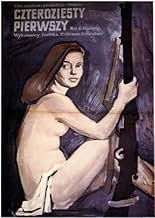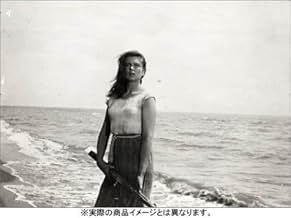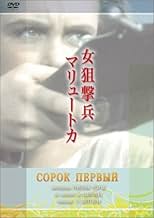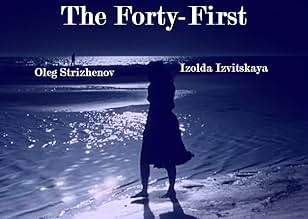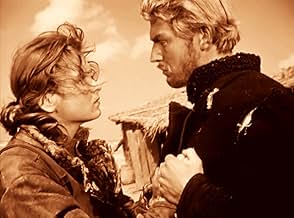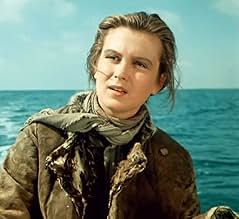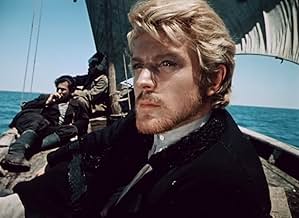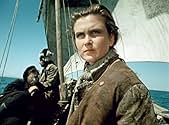NOTE IMDb
7,5/10
1,8 k
MA NOTE
Une romance inattendue survient entre une tireuse d'élite de l'Armée rouge et un officier de l'Armée blanche.Une romance inattendue survient entre une tireuse d'élite de l'Armée rouge et un officier de l'Armée blanche.Une romance inattendue survient entre une tireuse d'élite de l'Armée rouge et un officier de l'Armée blanche.
- Réalisation
- Scénario
- Casting principal
- Récompenses
- 1 victoire et 1 nomination au total
Nikolai Dupak
- Soldier Andrei Chupilko
- (as N. Dupak)
Georgi Shapovalov
- Soldier Terentyev
- (as G. Shapovalov)
Lev Kovylin
- Soldier Kovylin
- (as L. Kovylin)
Yuriy Romanov
- Soldier Vyakhir
- (as Yu. Romanov)
Daniil Netrebin
- Soldier Semyannin
- (as D. Netrebin)
Asanbek Umuraliyev
- Soldier Umankul
- (as A. Umuraliev)
Anatoli Kokorin
- Soldier Yegorov
- (as A. Kokorin)
Vadim Sinitsyn
- Wounded soldier
- (as V. Sinitsyn)
Kirey Zharkimbayev
- Timerkul
- (as K. Zharkimbayev)
Avis à la une
Grigori Chukhrai's film, The Forty First, sets itself up to be understood as a mythic series of events; the opening scene's churning waves seem to take the viewer away to a different world and the narration sets the story in the post-Revolutionary Civil War. This narration gives the effect of a story being told, and the way the landscape is portrayed creates an unreal landscape. The colors always seem too saturated and the sky hangs close and heavy over the actors, giving the appearance of a fish bowl. Maryutka's inclusion in the plot attests to the Bolshevik ideal of gender equality, making a break with Stalinism's reinstatement of traditional gender roles; her being referred to as an "Amazon" enhances the mythic quality of the film. Chukhrai consciously constructs shots that juxtapose; the scene of Maryutka and the White Army lieutenant walking separate on the beach contrasts the two in space as they both walk in different points of the frame in different directions. The final scenes are obviously ideological: the dialogue is crafted as a metaphor for Tsarist Russia and Communist Russia, with the lieutenant (Tsarism) pleading Maryutka (Communism) to return to how they were before the fighting; the officer's dangling cross necklace is an ever-present symbol of Imperial Russia, designating that even when all visual indicators of partisanship are gone (as he and Maryutka's uniforms have been destroyed by the elements), there is still an irreconcilable difference present. The last scene illustrates the valuation of duty over emotions. Besides the smartly handled ideology, the visual effects are The Forty First's strengths. The color palette and the contrasts it creates are striking, and create a hazy, dreamlike world in which a legend is played out.
like many films from the same period, the poetry of image saves it from the ideological web. because the basic aesthetic virtues are only parts of a splendid love story in the time of war. because the story is just support for seductive images. a film about borders and feelings. honest, fresh, melancholic, bitter. but useful for discover the spirit of a slice of history and the art of a great director. for discover the nuances who are only fruits of each detail. and to meet two interesting actors. a film about war, hate, love and strange form of peace. and, sure, about the duty. as piece who defines the characters. the last scene remains a long time in memory. not only for the drama but for the profound poetry who transforms the political command in seed of a story after the film's story. a film about the most precious emotion. made in one of the most inspired manners.
wise use of close-up.wonderful images. pure poetry. a special vision about war and love. all of that makes it more than propaganda tool but an impressive expression of profound art. it is a film about values and beauty, choices and ideals. realistic, cruel, full of subtle symbols - the desert, the isle -, mark of a great director and science of nuances from two impressive actors. the story is only basic point for respect the ideological commands. but the skin of this nucleus has the rare virtue to make it more than piece of a period. the final dialog between lovers , the end, the boat in storm and near the isle, each is a precious ingredient for an universal message about duty and choices, far to basic triumphal message of regime.
Watching this I was reminded of Hollywood Westerns of the mid-1950s, with the saturated color and framing of faces for psychological effect. The constant orchestral score was sometimes unnecessary and somewhat annoying; but as an interview with the director points out, the idea wasn't a grim war story, or even a political screed, but a love story, where sweeping music isn't out of place; and this is a love story.
The scenes with the nomads are striking and unforgettable; the desert sequences are also memorable, as is most of the film.
Much of the acting could be considered somewhat overwrought, with people flinging themselves down on the ground and making exaggerated gestures, so much so it almost seemed a modernized film with silent movie performances.
For those unfamiliar with the original novella, it may not matter, but the movie stays quite close to the story.
Honestly, this movie does seem dated, but is well worth the time for several scenes of honest beauty and some decent-enough acting performances. And, I have to admit, while I watched the majority of the film with more or less dispassionate interest, I was unprepared for the rifle shot at the end. It's much, MUCH more shocking than I expected, and if only for that reason, this movie sticks in my head.
The scenes with the nomads are striking and unforgettable; the desert sequences are also memorable, as is most of the film.
Much of the acting could be considered somewhat overwrought, with people flinging themselves down on the ground and making exaggerated gestures, so much so it almost seemed a modernized film with silent movie performances.
For those unfamiliar with the original novella, it may not matter, but the movie stays quite close to the story.
Honestly, this movie does seem dated, but is well worth the time for several scenes of honest beauty and some decent-enough acting performances. And, I have to admit, while I watched the majority of the film with more or less dispassionate interest, I was unprepared for the rifle shot at the end. It's much, MUCH more shocking than I expected, and if only for that reason, this movie sticks in my head.
This is a very nice story, love and war story. This is a war movie without violence. In all the movie you see only three shoots. A great end for a great movie. It shows that war films can be done without blood everywhere.
Le saviez-vous
- ConnexionsFeatured in Fejezetek a film történetéböl: A szovjet film 1953-1970 (1990)
Meilleurs choix
Connectez-vous pour évaluer et suivre la liste de favoris afin de recevoir des recommandations personnalisées
- How long is The Forty-First?Alimenté par Alexa
Détails
Contribuer à cette page
Suggérer une modification ou ajouter du contenu manquant

